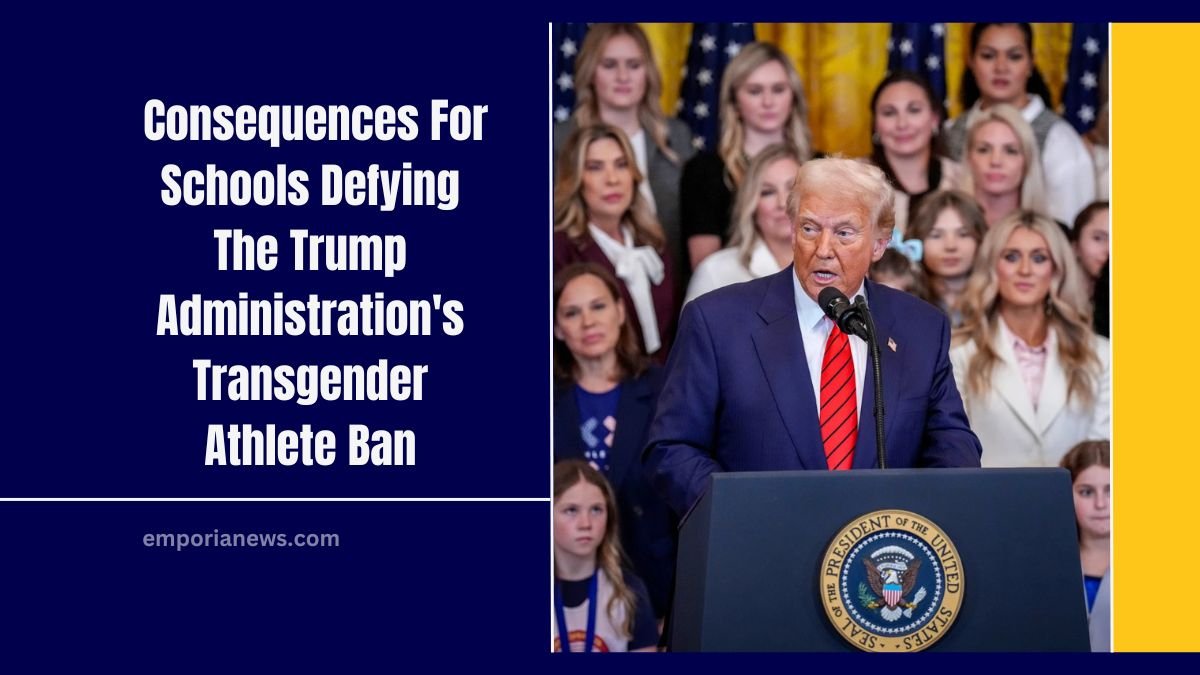In February 2025, President Donald Trump signed an executive order titled “Keeping Men Out of Women’s Sports,” aiming to prohibit transgender women and girls from participating in female sports teams.
This directive mandates that educational institutions receiving federal funding must enforce this ban or risk losing financial support.
The order has sparked significant debate and raised questions about the enforcement mechanisms and potential repercussions for schools that choose not to comply.
Understanding the Executive Order
The executive order directs federal agencies to interpret Title IX—a federal civil rights law that prohibits sex-based discrimination in educational programs and activities receiving federal financial assistance—in a manner consistent with the ban on transgender athletes in women’s sports.
Specifically, it instructs the Department of Education to take appropriate actions to protect female athletic opportunities and maintain the integrity of women’s locker rooms.
This includes initiating investigations into institutions suspected of non-compliance and potentially revoking federal funding.
Potential Consequences for Non-Compliance
Schools that refuse to adhere to the executive order may face several consequences:
- Loss of Federal Funding: The most immediate and impactful consequence is the potential withdrawal of federal funds. This includes financial aid, grants, and other forms of federal assistance that many educational institutions rely upon.
- Civil Rights Investigations: The Department of Education has the authority to conduct civil rights investigations into schools suspected of violating Title IX as interpreted under the new directive. Such investigations can lead to legal challenges and require institutions to allocate resources to address compliance issues.
- Legal Challenges: Non-compliant institutions may face lawsuits from individuals or groups alleging discrimination or violation of federal law. These legal battles can be costly and damage the institution’s reputation.
Enforcement Challenges
Enforcing the ban presents several challenges:
- Determining Compliance: Identifying whether a student is transgender involves sensitive personal information, raising privacy concerns and ethical questions about how schools would ascertain a student’s gender identity.
- State vs. Federal Policies: Some states have laws that protect transgender students’ rights, including participation in sports consistent with their gender identity. This creates a conflict between state and federal directives, leaving schools in a challenging position regarding which regulations to follow.
- Public Opposition and Support: The executive order has garnered both support and criticism. Advocates argue it ensures fairness in women’s sports, while opponents view it as discriminatory against transgender individuals. This division can lead to public protests, impacting the school environment and community relations.
Case Studies: Institutional Responses
Several institutions have already faced scrutiny under the new directive:
| Institution | Action Taken | Outcome |
|---|---|---|
| San Jose State University | Investigated for allowing a transgender athlete to compete on a women’s team. | Under federal investigation; potential risk of losing federal funding. |
| University of Pennsylvania | Faced inquiry over a transgender swimmer’s participation in women’s competitions. | Subject to civil rights investigation; compliance measures under review. |
| Massachusetts Interscholastic Athletic Association | Examined for policies permitting transgender athletes in female sports. | Under investigation; potential policy revisions anticipated. |
Legal and Ethical Considerations
The executive order raises significant legal and ethical questions:
- Title IX Interpretation: The reinterpretation of Title IX to exclude transgender athletes from women’s sports is contentious. Historically, Title IX has been used to combat sex-based discrimination, and its application in this context is subject to legal challenges.
- Ethical Implications: Enforcing the ban may require invasive measures to verify a student’s gender, leading to potential violations of privacy and bodily autonomy. Additionally, excluding transgender athletes can have adverse effects on their mental health and well-being.
The Trump administration’s executive order banning transgender athletes from women’s sports places educational institutions in a complex position, balancing federal directives against ethical considerations and potential legal challenges.
Schools must carefully evaluate the implications of compliance or non-compliance, considering the potential loss of federal funding, legal repercussions, and the impact on their student communities.
As the situation evolves, institutions will need to stay informed about legal developments and engage in thoughtful policy discussions to navigate this contentious issue.




